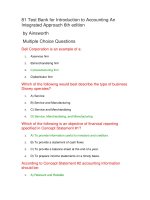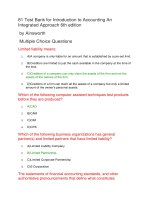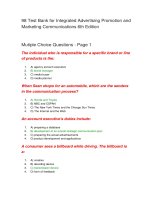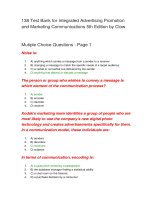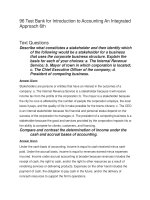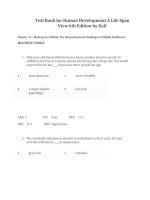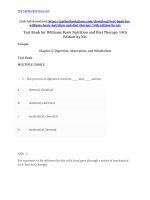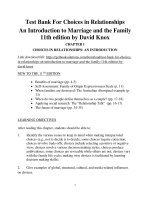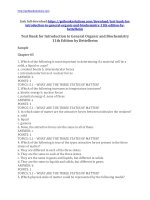Test bank for introduction to maternity and pediatric nursing 6th edition by leifer
Bạn đang xem bản rút gọn của tài liệu. Xem và tải ngay bản đầy đủ của tài liệu tại đây (356.98 KB, 24 trang )
Instant download : Test Bank for Introduction to Maternity and Pediatric
Nursing 6th Edition by Leifer
CLICK HERE
Chapter 20: The Adolescent
MULTIPLE CHOICE
1. When assessing a 13-year-old boy, the nurse would keep in mind
physical changes in the pubertal male begin with:
a.
development of axillary and facial hair.
b.
enlargement of penis.
c.
enlargement of testicles.
d.
pigmentation of the scrotum.
ANS: C
In boys, pubertal changes begin with enlargement of the testicles and internal
structures.
DIF:
Cognitive Level: Comprehension
TOP: Physical Development
Process Step: Assessment
REF:
p. 454
KEY:
OBJ:
2
Nursing
MSC: NCLEX: Health Promotion and Maintenance: Growth and
Development
2. A 13-year-old boy states, “The girls in my class tower over me.” The
nurse’s most informative response would be:
a.
“It may seem that way because girls have
a growth spurt 2 years earlier than boys.”
b.
“Perhaps your parents are not
exceptionally tall.”
c.
“Boys usually experience a growth spurt 1
year earlier than girls.”
d.
“You may feel short, but you are actually
average height for your age.”
ANS: A
Although the age for growth spurts during puberty varies, growth spurts occur
2 years earlier for girls than for boys.
DIF:
Cognitive Level: Application
TOP: Physical Development
Process Step: Implementation
REF:
p. 462
KEY:
MSC: NCLEX: Health Promotion and Maintenance: Growth and
Development
OBJ:
2
Nursing
3. A parent comments that her adolescent daughter seems to be
daydreaming a lot. The nurse understands that this behavior indicates
she is:
a.
bored.
b.
not getting enough rest.
c.
trying to block out stress and anxiety.
d.
mentally preparing for real situations.
ANS: D
Daydreaming allows adolescents to act out in their imaginations what will be
said or done in certain situations. This helps them to prepare for and cope
with interactions with others.
DIF:
Cognitive Level: Analysis
TOP: Development-Daydreams
Assessment
REF:
p. 460
OBJ:
3
KEY: Nursing Process Step:
MSC: NCLEX: Health Promotion and Maintenance: Growth and
Development
4. The nurse planning a safety program for high school students should
understand that most accidental deaths in adolescence are related to:
a.
firearms.
b.
automobiles.
c.
drowning.
d.
diving injuries.
ANS: B
The chief safety hazard for the adolescent is automobiles.
DIF:
TOP:
Cognitive Level: Knowledge
Safety
REF:
p. 465
OBJ:
14
KEY: Nursing Process Step: Planning
MSC: NCLEX: Health Promotion and Maintenance: Growth and
Development
5. A 16-year-old excitedly tells his parents that he was offered a part-time
job. Which response represents an effective problem-solving approach
for his parents?
a.
“Your studies are too important for you to
have a part-time job.”
b.
“When we went to high school, academics
were the adolescent’s priority.”
c.
“We want you to put your earnings in a
savings account.”
d.
“How do you think you will manage your
school work and a job?”
ANS: D
An effective approach to help adolescents learn to solve problems is for
parents to guide them in exploring alternatives.
DIF:
box
Cognitive Level: Application
OBJ: 3
Evaluation
TOP:
Parenting
REF:
p. 463, Health Promotion
KEY: Nursing Process Step:
MSC: NCLEX: Health Promotion and Maintenance: Growth and
Development
6. One psychosocial task of adolescence on which the nurse must focus
when planning care is the development of a sense of:
a.
initiative.
b.
industry.
c.
identity.
d.
involvement.
ANS: C
Psychosocial milestones that must be accomplished during adolescence
include the five Is—image of self, identity, independence, interpersonal
relationships, and intellectual maturity.
DIF:
OBJ:
Cognitive Level: Knowledge
3
TOP:
REF:
p. 456, Box 20-1
Psychosocial Development
KEY: Nursing Process Step: Planning
MSC: NCLEX: Health Promotion and Maintenance: Growth and
Development
7. A 13-year-old girl tells the school nurse that she is getting fat, especially
in her hips and legs. The understanding by the nurse that would best
guide the response is:
a.
many adolescents are unaware of proper
nutrition.
b.
adolescents of this age become less
active and should eat fewer calories.
c.
puberty is often preceded by fat deposits
in these areas.
d.
as soon as menarche occurs, she will lose
this excess weight.
ANS: C
Secondary sexual characteristics become apparent before menarche. Fat is
deposited in the hips, thighs, and breasts, causing them to enlarge.
DIF:
OBJ:
Cognitive Level: Analysis
2
TOP:
REF:
p. 455, Box 20-2
Physical Development
KEY: Nursing Process Step: Planning
MSC: NCLEX: Health Promotion and Maintenance: Growth and
Development
8. The school nurse is planning a program for girls about the physical
changes of puberty; this program should be directed to girls of the age
of _____ years.
a.
16
b.
14
c.
12
d.
10
ANS: D
Because puberty can occur in girls as early as age 10 years, instruction must
be given by that age.
DIF:
Cognitive Level: Comprehension
REF:
p. 455
TOP: Physical Development
Process Step: Planning
KEY:
OBJ:
2
Nursing
MSC: NCLEX: Health Promotion and Maintenance: Growth and
Development
9. The statement made by a parent indicating understanding about helping
a 13-year-old manage his allowance is:
a.
“I set amounts he can earn for particular
chores.”
b.
“I give him a certain amount of money for
each day.”
c.
“I put money into his bank account each
month.”
d.
“I told him to ask me when he needs
money.”
ANS: A
If money is simply handed out as requested, it is difficult to develop
responsibility for finances and money management. The older adolescent is
able to get a job. The younger adolescent can earn money by doing particular
chores.
DIF:
Cognitive Level: Application
TOP: Development-Responsibility
Evaluation
REF:
p. 460
OBJ:
KEY: Nursing Process Step:
MSC: NCLEX: Health Promotion and Maintenance: Growth and
Development
10.
The nurse suggests a good dietary source of zinc for an
adolescent who is a vegetarian would be:
a.
green, leafy vegetables.
b.
citrus fruits.
c.
nuts.
d.
enriched breads.
5
ANS: C
Zinc is essential for growth and sexual maturation in adolescence. Good
vegetable sources include nuts, legumes, and wheat germ.
DIF:
TOP:
Cognitive Level: Comprehension
Nutrition
REF:
p. 464
OBJ:
KEY: Nursing Process Step: Assessment
MSC: NCLEX: Health Promotion and Maintenance: Growth and
Development
11.
An adolescent’s parent comments, “My son seems so
preoccupied with his appearance these days. Is this normal?” The
nurse’s best response would be:
a.
“It is his attempt to express his
individualism.”
b.
“His preoccupation with his looks is quite
normal.”
c.
“He is probably troubled with his physical
changes.”
d.
“This shows that he has a positive selfimage.”
ANS: B
Preoccupation with self-image is normal and accounts for the constant
primping of adolescents.
DIF:
Cognitive Level: Application
REF:
p. 458, Table 20-1
11
OBJ:
14
TOP:
Development
KEY: Nursing Process Step: Planning
MSC: NCLEX: Health Promotion and Maintenance: Growth and
Development
12.
Foods that would be a healthy choice for an adolescent who just
finished playing in a strenuous game would be:
a.
a cheeseburger and soda.
b.
a hot fudge sundae.
c.
two sausage and egg breakfast
sandwiches and orange juice.
d.
a bagel and skim milk.
ANS: D
A bagel provides a rapid supply of carbohydrates to the muscles, and skim
milk provides a slow release of carbohydrates to the muscles.
DIF:
TOP:
Cognitive Level: Application
Nutrition
REF:
p. 464
KEY: Nursing Process Step: Assessment
MSC: NCLEX: Health Promotion and Maintenance: Growth and
Development
OBJ:
11
13.
When planning to answer a 16-year-old girl’s questions about
menstruation, the nurse must consider cognitive development.
According to Piaget, the cognitive aspect that is developed during
adolescence is the ability to:
a.
view a situation from multiple
perspectives.
b.
focus more on the past than present
situations.
c.
exercise concrete reasoning.
d.
consider hypothetical situations.
ANS: D
According to Piaget, in the formal operations stage adolescents have the
ability to think abstractly.
DIF:
OBJ:
Cognitive Level: Comprehension
4
TOP:
REF:
p. 452, Box 20-1
Cognitive Development
KEY: Nursing Process Step: Planning
MSC: NCLEX: Health Promotion and Maintenance: Growth and
Development
14.
A girl tells the nurse that she and her best friend belong to the
popular clique. She states, “I love Lady Gaga, and I want to be a
singer.” The nurse recognizes the girl’s statement as characteristic of
peer relationships in:
a.
early adolescence.
b.
middle adolescence.
c.
late adolescence.
d.
the entire adolescent period.
ANS: A
Cliques of unisex friends, having a best friend, and hero worship are
characteristics of the early adolescent.
DIF:
OBJ:
Cognitive Level: Comprehension
8
TOP:
REF:
p. 454, Table 20-1
Social Development
KEY: Nursing Process Step: Assessment
MSC: NCLEX: Health Promotion and Maintenance: Growth and
Development
15.
The nurse is leading a discussion group with parents of
adolescents. One parent comments, “My son can’t do anything without
checking with his friends first. My opinion doesn’t count anymore.” The
nurse would formulate a response on the knowledge that this behavior
is:
a.
unusual for adolescent boys.
b.
often more apparent in boys than girls.
c.
a normal phenomenon during
adolescence.
d.
suggestive of feelings of low self-worth.
ANS: C
Parents may need help understanding that the adolescent’s exaggerated
conformity is necessary for moving away from dependence and obtaining
approval from persons outside the nuclear family.
DIF:
Cognitive Level: Application
TOP: Peer Relationships
Planning
REF:
p. 459
OBJ:
9
KEY: Nursing Process Step:
MSC: NCLEX: Health Promotion and Maintenance: Growth and
Development
16.
The nurse points out to a group of parents that the most positive
developmental significance of a peer group to the adolescent is that the
group serves as a(n):
a.
social outlet.
b.
association to blur personal identity.
c.
platform for “group think.”
d.
initial separation from family.
ANS: D
Being a member of a peer group and communicating with and seeking
approval from this group are the first separation from the family.
DIF:
OBJ:
N/A
Cognitive Level: Analysis
9
TOP:
REF:
Peer Groups
p. 458, Table 20-1
KEY: Nursing Process Step:
MSC: NCLEX: Health Promotion and Maintenance: Growth and
Development
17.
The nurse understands that the adolescent’s avid sexual
orientation to be based on Freud’s theory, which describes adolescence
as the __________ stage.
a.
conceptual
b.
genital
c.
glandular
d.
pubertal
ANS: B
Freud describes the adolescent period as genital.
DIF:
Cognitive Level: Knowledge
OBJ: 4
Assessment
TOP:
Freud
REF:
p. 452, Box 20-1
KEY: Nursing Process Step:
MSC: NCLEX: Health Promotion and Maintenance: Growth and
Development
18.
The nurse using the PACE interview guide for persons at risk for
substance abuse arrives at a score of 2 for an adolescent patient. The
nurse should assess this score as:
a.
nonindicative of potential substance
abuse.
b.
normal experimentation of the adolescent.
c.
need to schedule another PACE interview
in 3 months.
d.
indication for referral for counseling.
ANS: D
The PACE guide recommends that a score of 2 or higher would suggest the
need for a referral for counseling about substance abuse.
DIF:
Cognitive Level: Knowledge
TOP: PACE Interview
Assessment
REF:
p. 466
OBJ:
14
KEY: Nursing Process Step:
MSC: NCLEX: Health Promotion and Maintenance: Growth and
Development
19.
The nurse explains that adolescent acne is the result of:
a.
ineffective sweat glands.
b.
oily skin.
c.
inadequate hygiene.
d.
a poor diet.
ANS: B
Adolescent acne is the result of overactive sweat glands and oily skin.
DIF:
Cognitive Level: Comprehension
REF:
p. 454
OBJ:
14
TOP:
Acne
KEY: Nursing Process Step: Implementation
MSC: NCLEX: Health Promotion and Maintenance: Growth and
Development
20.
The nurse suggests the use of “I” messages to communicate a
parent’s feeling to an adolescent. The most appropriate example of an
“I” message is:
a.
“I feel frightened when you stay out past
your curfew.”
b.
“I am your mother, and I insist that you
observe your curfew.”
c.
“I am sick and tired of your staying out
late.”
d.
“I expect you to show me proper respect.”
ANS: B
This is the only statement that associates the parent’s feelings associated with
the adolescent behavior that is not aggressive or accusatory.
DIF:
box
OBJ:
Cognitive Level: Analysis
1
TOP:
REF:
“I” statements
KEY: Nursing Process Step: Implementation
p. 463, Health Promotion
MSC: NCLEX: Psychosocial Integrity: Coping and Adaptation
MULTIPLE RESPONSE
21.
The nurse explains that the restlessness seen in the adolescent
is, in part, attributable to what? Select all that apply.
a.
Drive to be accepted by society as an
individual
b.
Urge for independence
c.
Establishment of a personal identity
d.
Intense libido
e.
Rapid body changes
ANS: A, B, C, D, E
All the options listed are sources of stress to the adolescent and are
stimulants to restlessness.
DIF:
TOP:
Cognitive Level: Comprehension
REF:
Sources of Stress for the Adolescent
pp. 451-452
OBJ:
13
KEY: Nursing Process Step: Implementation
MSC: NCLEX: Health Promotion and Maintenance: Growth and
Development
22.
The nurse points out that prior to a big exam, what is the best
breakfast to provide high levels of alertness and increased memory?
Select all that apply.
a.
Pancakes and syrup
b.
Coffee and chocolate-covered donuts
c.
Bacon and fried eggs
d.
Whole grain cereal and yogurt
e.
Oatmeal and sliced apples
ANS: D, E
Meals high in protein will break down into norepinephrine and increase
alertness. Meals with a high sugar content result in a soothing sleepy
response. Meals high in fats digest slowly and draw blood from the brain
during the lengthy digestive process.
DIF:
TOP:
Cognitive Level: Application
Nutrition
REF:
p. 465
OBJ:
KEY: Nursing Process Step: Implementation
11
MSC: NCLEX: Physiological Integrity: Physiological Adaptation
23.
The nurse considers what “rites of passage” valued by the
adolescent in American society? Select all that apply.
a.
Attaining legal drinking age
b.
Selection of a career
c.
Religious affiliation
d.
Obtaining a driver’s license
e.
High school graduation
ANS: A, D, E
Rites of passage are socially recognized milestones that signify adulthood.
Legal drinking age, driver’s license, and matriculation through high school are
such signals. Religious affiliation and selection of a career path do not
necessarily signal adulthood.
DIF:
OBJ:
Cognitive Level: Analysis
8
TOP:
REF:
p. 466, Nursing Tip
Rites of Passage
KEY: Nursing Process Step: Assessment
MSC: NCLEX: Health Promotion and Maintenance: Growth and
Development
24.
A mother confides in the school nurse that she witnessed her son
kissing another boy. On which of these concepts should the nurse base
his reply? Select all that apply.
a.
Homosexual behavior in adolescents is
not uncommon.
b.
Homosexuality is a mental disorder.
c.
Adolescents often desire to explore
alternative lifestyles.
d.
Homosexual tendencies should be
addressed with counseling.
e.
Parents should seek a support group for
parents of gays.
ANS: A, C
Adolescents may experiment with an alternate sexual expression as part of
their self-discovery. Homosexual activities are not uncommon in adolescence.
DIF:
Cognitive Level: Analysis
TOP: Homosexuality
Implementation
REF:
p. 462
OBJ:
13
KEY: Nursing Process Step:
MSC: NCLEX: Health Promotion and Maintenance: Growth and
Development
COMPLETION
25.
The nurse is amused, but understands that as adolescents strive
for individuality, the strongest need of any adolescent in society is that
of _______________.
ANS:
conformity
For all of the stress from coming of age as an individual in his own right, the
adolescent also has an equal drive for conformity.
DIF:
Cognitive Level: Analysis
TOP:
Conformity
REF:
p. 452
OBJ:
9
KEY: Nursing Process Step: Assessment
MSC: NCLEX: Health Promotion and Maintenance: Growth and
Development
26.
The nurse knows that an adolescent may find making a career
choice difficult because there is less clarity in ______________ roles.
ANS:
gender
The blurring of gender roles in the United States—women holding jobs as
engineers, lawyers, and physicians; and men entering nursing and culinary
pursuits—has caused confusion with the selection of a career path.
DIF:
Cognitive Level: Analysis
REF:
p. 452
OBJ:
13
TOP: Blurred Gender Roles
Planning
KEY: Nursing Process Step:
MSC: NCLEX: Health Promotion and Maintenance: Growth and
Development
27.
The nurse stresses the need for using a sunscreen with a Sun
Protection Factor (SPF) of at least _____.
ANS:
15
A sunscreen with a SPF of at least 15 is recommended to block sun rays that
cause cancer.
DIF:
TOP:
Cognitive Level: Knowledge
Sunscreen
REF:
p. 465
OBJ:
10
KEY: Nursing Process Step: Implementation
MSC: NCLEX: Health Promotion and Maintenance: Prevention and Early
Detection of Disease
28.
______________ is frequently delayed in girls who are involved in
activities that require a lean body and a high level of physical activity.
